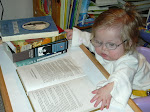I recently read Henri Nouwen's book on leadership entitles In the Name of Jesus. It is one of the few books I am certain to read again and one of even fewer books I can recommend without any cautions or reservations (which probably has a lot to do with me being a book snob and rather critical by nature). Henri Nouwen is one of the Christian leaders I look up to and try to emulate. It makes me sad and a little angry that the Evangelical subculture of which I am a part has exalted good speakers, great businessmen and administrators, best-selling authors, and crafty politicians. Those are the people I am often encouraged to follow. I know I am not saying anything new. Everyone knows about the cult of success and the idol of numerical growth. But it is stil disturbing. So, I turn to people like Nouwen to be reminded of God's approved leaders. A lot of them are bad at speaking, like Moses. They are horrible at politics and get in trouble with the government, like the prophets. Their writing style is raw and unpolished, with a possible exception of Paul. But Paul was pretty bad at running organizations. What unites them all is brokenness. They are humble, vulnerable and connected with Christ in suffering. Let's teach that in seminaries... Henri Nouwen left his teaching carreer after 20 years at Notre Dame, Yale and Harvard and became a pastor of Daybreak, a community for mentally handicapped people. Here is how he describes his transition.
“The first thing that struck me when I came to live in a house with mentally handicapped people was that their liking or disliking me had absolutely nothing to do with any of the many useful things I had done until then. Since nobody could read my books, they could not impress anyone, and since most of them never went to school, my twenty years at Notre Dame, Yale, and Harvard did not provide a significant introduction. My considerable ecumenical experience proved even less valuable. When I offered some meat to one of the assistants during dinner, one of the handicapped men said to me, “Don’t give him meat, he doesn’t eat meat, he’s a Presbyterian.”
Not being able to use any of the skills that had proved so practical in the past was a real source of anxiety. I was suddenly faced with my naked self, open for affirmations and rejections, hugs and punches, smiles and tears, all dependent simply on how I was perceived at the moment. In a way, it seemed as though I was starting my life all over again. Relationships, connections, reputations could no longer be counted on. This experience was and, in many ways, is still the most important experience of my new life, because it forced me to rediscover my true identity. These broken, wounded, and completely unpretentious people forced me to let go of my relevant self – the self that can do things, show things, prove things, build things – and forced me to reclaim that unadorned self in which I am completely vulnerable, open to receive and give love regardless of any accomplishments.”
Tuesday, August 21, 2007
Subscribe to:
Post Comments (Atom)

No comments:
Post a Comment